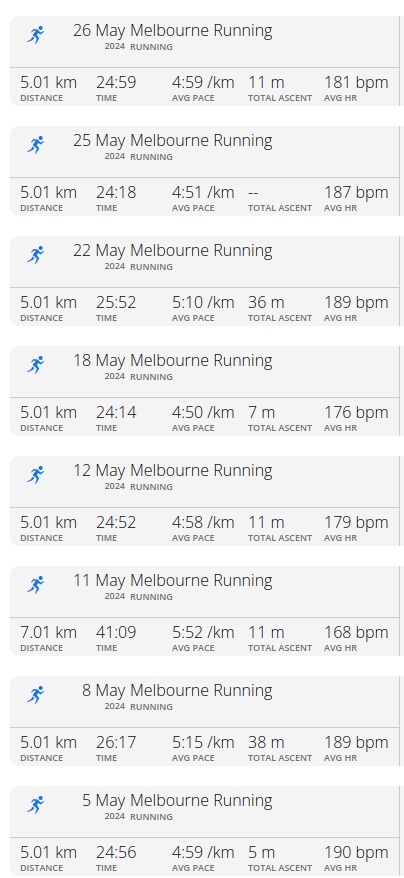
This is not a decision market - barring some good reason not to, I am going to try this at some point in the coming months. This is a predictive market, though I wont bet on it since evidence for resolution comes via me (I'll try to show good evidence like a photo of my Garmin watch).
(And before anyone comments: yes I know you have to taper Clonidine)
I currently take Clonidine, which is prescribed off-label to address sleep disturbance caused by stimulant medication. It works great for that. I take 150mcg in the evenings.
However, since I started taking it, I seem to not be able to run as fast. This isn't a problem per se - I run for physical and mental health, not to set records, but it made me curious whether the Clonidine is the cause (it might not be, it's certainly not a controlled experiment). Reading others' experiences on e.g. Reddit seems to suggest some other people do experience this sort of thing. It decreases blood pressure - I guess it makes sense it could impact exercise?
Here is a run from a little under a year ago, in which I was targeting an average pace of 5min/km:

Whereas here is a run from this week:

Which was significantly slower at a comparable average heart rate.
This second run incorporated interval training, so whilst I wasn't targeting a specific speed, I was not holding back on the fast bits of the intervals, this felt like a tough-ish run. Normally I expect interval training to result in higher average speeds than running to a target pace, so this slower average pace surprised me a bit. This was also the second example - I also did interval training a few days prior with a similar result.
For most of the past year I've focused on slower runs in order to avoid injury, otherwise I'd have more examples - I'm increasing speed again now because injury seems to have not reared its head in a while. In the past after running slower for a while I have not really had any trouble increasing speed like that, and 5min/km has been reasonably well within my abilities for a long time.
I thought the slower runs were harder too after starting on Clonidine, but that seemed more subjective (and pace vs heart rate data does not seem to support any conclusion), whereas when I went harder with the interval training, it seemed like that was clearer evidence that I can't run as fast at the same level of exertion as before.
I'll try to get some more controlled data by attempting a 5min/km constant pace run soon-ish. The above interval training was in the evening on a weekday on which I'd taken stimulant medication in the morning, but to be more controlled I should attempt on a Sunday (I don't take stimulants on the weekend, but I do still take Clonidine). It's possible a more controlled attempt will invalidate my hypothesis, in which case I will probably NA this market.
Anyway, on to resolution criteria. At some point in the coming months I'll taper down my Clonidine dose to zero (this will take at least three weeks). This isn't a priority, because other experimentation with medication dose and timing tweaks are more likely to happen first, but is something I plan to do at some point.
At that point, and waiting to be not sick or anything else that you'd expect to impact running performance significantly, I'll attempt to run 5km in 25 minutes. I'll do this on the weekend after a good night's sleep and no stimulants that day or the day previous, and no alcohol the previous day.
For this market to resolve YES, barring something like a sudden injury or freak magpie attack cutting my run short, I must succeed on the first attempt, otherwise it resolves NO. The point of this is that it's something I expect I should be able to do relatively easily.
It wouldn't be in the spirit of this market if I can run 5km in 25min, but only by being near my max heart rate, hence I've put an upper limit (exclusive) of 190bpm average (my max heart rate is something like 215bpm). This means I can go up to 7bpm faster than the March 2023 run, which seems pretty generous.
I've got a good smart watch that I can use to track my average speed and ensure that I am targeting just under 25 minutes without going excessively fast and going over the 190bpm average unnecessarily. If I screw this up for dumb reasons like incorrect mental arithmetic, I reserve the right to re-attempt, otherwise it stands.
My running is mostly on a grass athletics track with negligible elevation change. In the first screenshot above I ran only at the track, whereas in the second one I ran from my house to the track first, which is about 1km, but the extra elevation change is not much. Future controlled runs for this market will be exclusively at the track.
(Edit: can't NA due to negative payouts, will ask for admin assistance)
Sorry folks, gonna NA this one early before NAing becomes no longer possible. I'm getting very close without having stopped taking clonidine, so expect to hit the target soon which would invalidate this market. Apologies, I'll come up with less NA-prone criteria in the future.

(note that that average heart rate is unlikely to be accurate given how the heart rate graph looks - but if you assume the more realistic heart rates later in the run are accurate, this still would have been decently within bounds)

Yeah it really just looks like I was anaemic, I haven't done a blood test but check out my resting heart rate dropping after starting supplementing iron*:
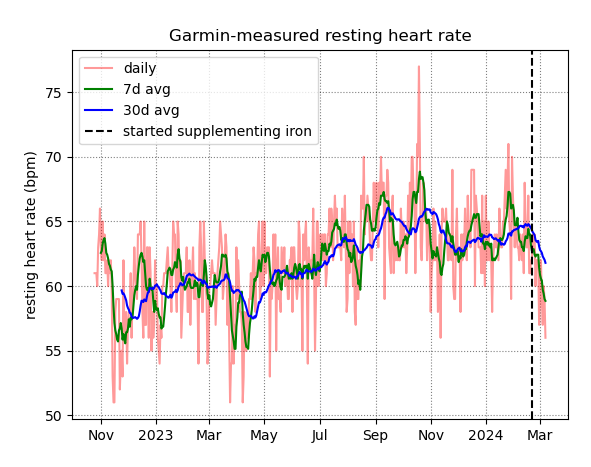
Unfortunately that likely means this market will N/A, as I expect I'll be able to run a 25 minute 5k within the heart rate limit in the coming weeks. Next time I'll frame the market criteria in terms of an improvement ("will <change> cause my 5k time to drop by <minutes>?") rather than an absolute threshold. That was silly!
(* I also supplemented B12, but iron is more likely culprit as I have supplemented B12 on and off in the past whereas supplementing iron is new)
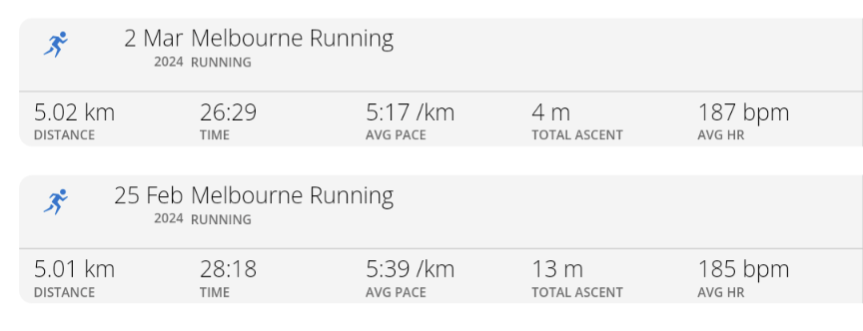
Two more runs, one a week ago and one today.
The one a week ago was very difficult, I felt lightheaded and couldn't keep up the target average pace (was aiming for 27:27), despite supposedly having a few more bpm in the tank. It was 30 °C and direct sun though, maybe made it harder.
In the run today, it was significantly easier to keep up, This was the best run I've done in a while.
Possibly relevant: about two weeks ago, wondering whether anaemia might be what's causing the crappy performance, I started (inconsistently) supplementing iron and vitamin B12. Over the past few days I've had a couple of resting heart rate measurements that are a bit lower as well (anaemia increases resting heart rate). Not enough to be sure, but with that and the better run today, maybe a hint that my problem is anaemia.
Reminder that if I run the target time within the allowed average heart rate, prior to cutting clonidine, the market will N/A.
The after-effects of whatever illness I had lasted a while, I still have a bit of a lingering cough but am mostly past it. Went for a 5k run today targeting 27:27 (11km/h):

Was pretty good, but my average heart rate was 189bpm, which is the highest it's allowed to be for the 25-minute attempt.
Updated plot (speed vs heart rate instead of pace, speed seems to be a more linear function of heart rate than pace does):
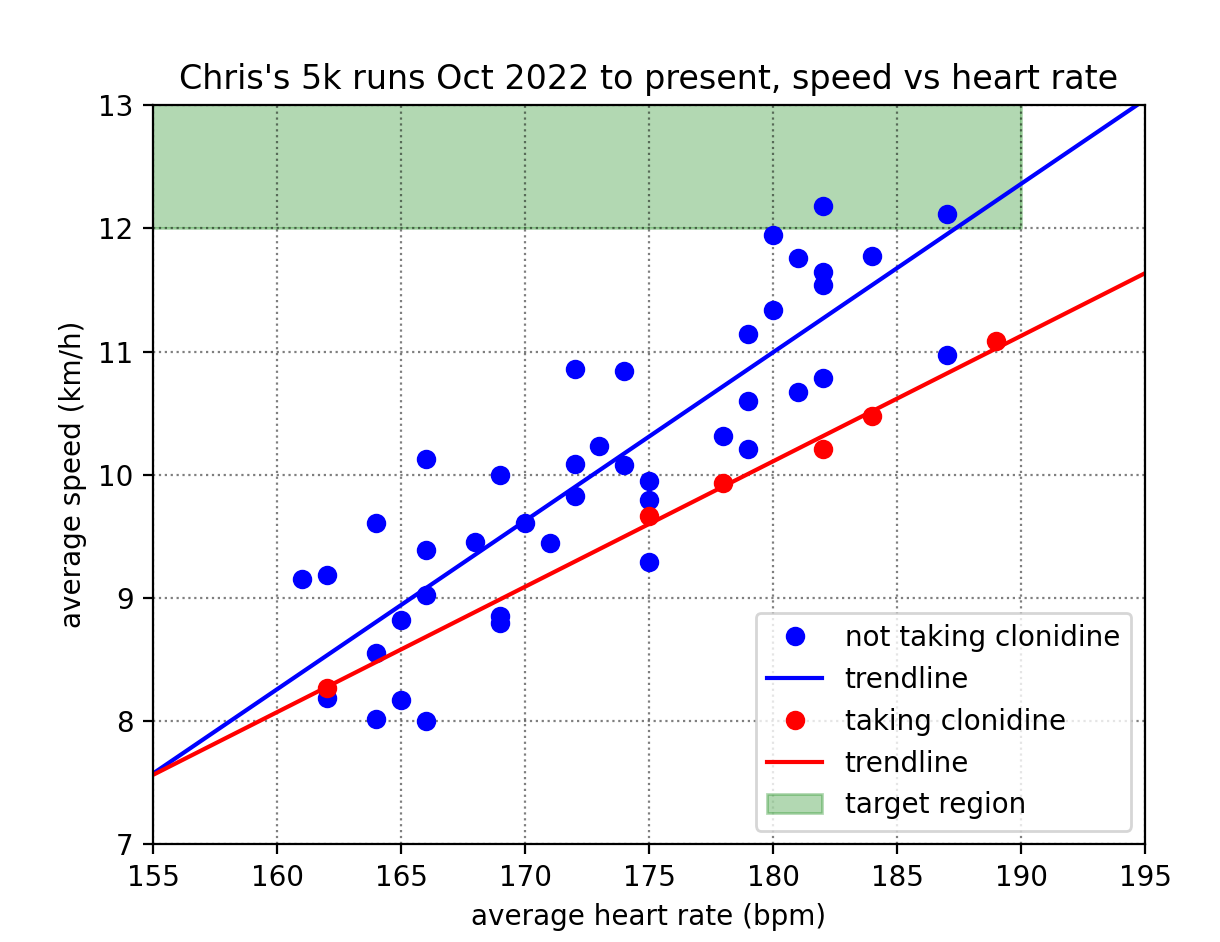
I came down with some respiratory illness (not COVID, flu, or RSV according to a PCR test) that has lasted some time, and now I have bronchitis that I imagine will last a few more weeks. Since I made this market I've only been for the one run yesterday, targeting 30 minutes for a 5k:

Pretty crappy performance (heart rate and subjective effort pretty high), but likely not representative as I'm not at my best.
Some data! Grabbed all my runs of distance between 5.00 and 5.05 km since I got my Garmin watch (Oct 2022) and plotted pace vs heart rate, before and after I started taking Clonidine (Nov 2023). So for this market to resolve YES, I'm going to have to do a run in that green region. You can see I've only done two 5k runs in this period that were faster than 5min/km, and both were below 190bpm heart rate.
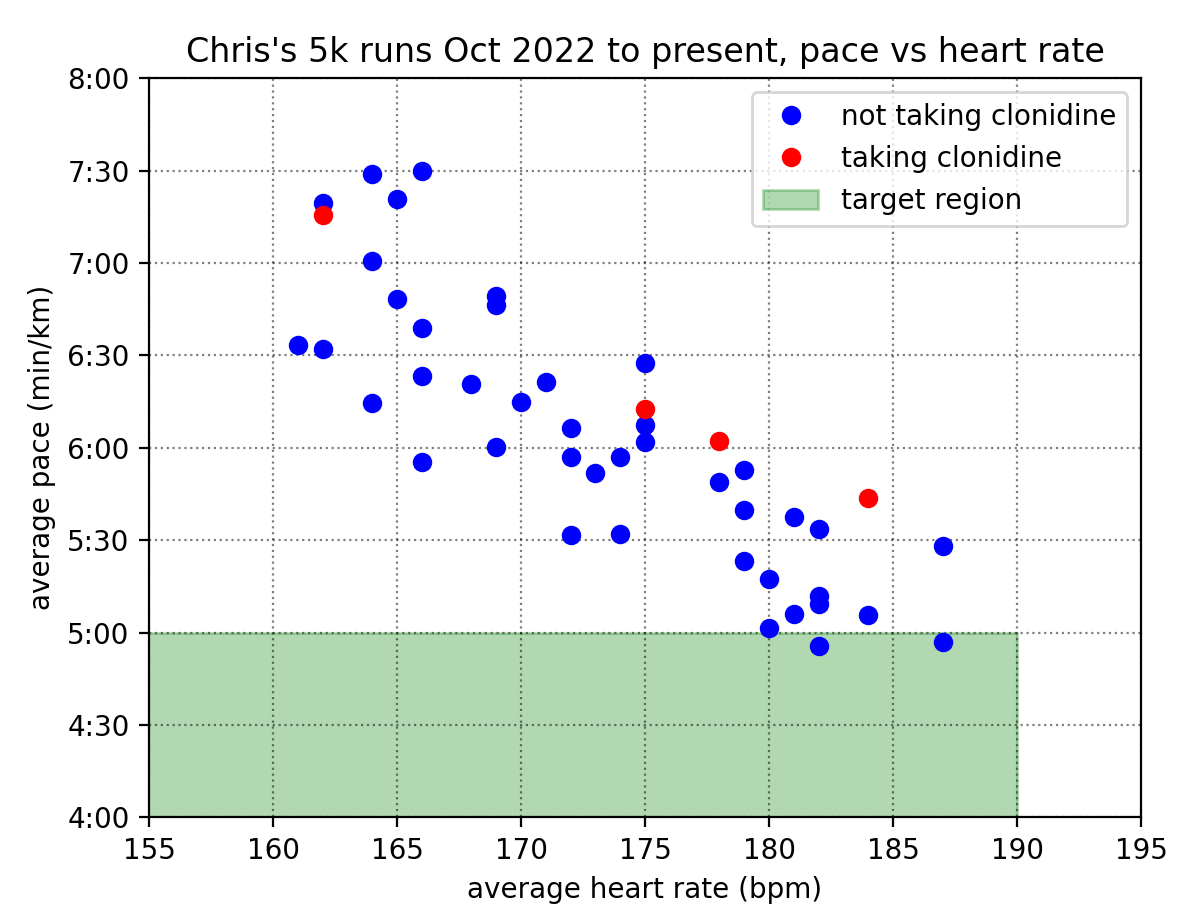
@PeterMillerc030 I'm 35. It was 225 a decade ago!
215 is a bit of a guess, the 225 a decade ago was actually measured, and I can easily get over 200 these days if I go for a hard run (the max during the interval training the other day was 200), but haven't actually tried to measure the max recently.
@chrisjbillington I think my fastest ever 5k was 19 minutes, at 37 years old, and I don't think I could get my heart rate over 180 at that time. Maybe not even that high, at race pace I think I was more like 170 bpm.
I don't think I know clonidine well enough to bet on this. I went through horrific withdrawal from some other sleeping pill (lunesta), and was unable to run for a year after quitting that one. Hopefully getting off clonidine isn't that bad.
@PeterMillerc030 that sounds terrible! Clonidine's unsafe to stop quickly because you'll get blood pressure spikes, and you can have crappy sleep for a bit due to having developed dependence, but I'm not under the impression it's too much of an issue for most people. Also, I'll probably resume taking it not long after stopping, just still experimenting with what works best.
Yeah it sounds like my max heart rate is decently higher than the average, but when I looked into it it seemed within the range of person-to-person variation. And when it was measured at 225 this was in the context of a cardiac exercise stress test and didn't seem to concern anyone. The "220 minus your age" rule seems to just be very crude.
@chrisjbillington Yeah, it was beyond bad. Still is somewhat bad, I never recovered fully. Don't ever touch benzos or z-drugs.
Is your resting heart rate also low?
The formula I have written down is:
VO2 max ~= 15.3 *(maximum heart rate/resting heart rate)
And 5k race performance should be predictable from VO2 max via this table:
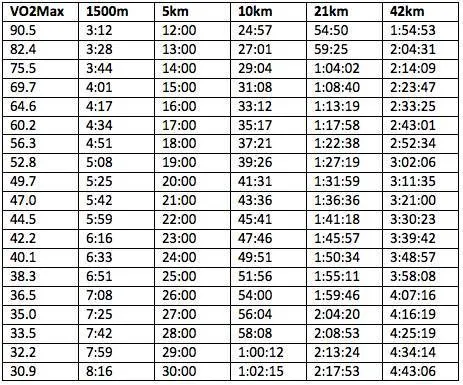
I remember all this stuff checked out for me.
Let's see, I was like 180 max, resting was maybe 50, so that says VO2max = 55.
19 minute 5 km is Vo2max 53.
Then I had it measured on a treadmill test and I got to about 53 (probably not exact cause I did it at the end of a longer test, but close enough).
@PeterMillerc030 Thanks for the info, that's pretty interesting! No, my resting heart rate is pretty normal - 63bpm at the moment apparently (what my Garmin watch measures when I'm asleep).
So I get 15.3 × 215/63 = 52.2, which interpolating your table gives a 19:50 5k.
My record would be somewhere between 21:00 and 21:30 I think, and a long time ago.
I've never had it measured, but my watch's estimate of my VO2 max is 48, so that'd be 20:40. No idea what the watch bases that on, but I know it wouldn't give an estimate until I went for some hard runs - maybe it wanted to estimate my MHR and then use a formula like yours.
I fully expect I should be able to run 22:30 or so if I'm able to do fast runs for a couple of months (or maybe even as short as weeks) without injury (ignoring possible effects of medication). That has been pretty achievable previously, and who knows, maybe I'd be able to get faster still - I've never really seen a plateau before having to scale back due to some injury or sore knees or whatnot.
@chrisjbillington None of those are exact, because VO2max is kind of like your cardiac output divided by your weight, so you can change the numerator or the denominator. I guess to the extent that the tables do work, they assume that athletes are similarly lean.
Plus also there's sport specific training needed beyond that to actually hit the optimal running times, like Lance Armstrong had a crazy high VO2max but his first marathon time was nowhere close to where that number would put him.
But it's still interesting to use some of those metrics to figure out what you'd be capable of.
